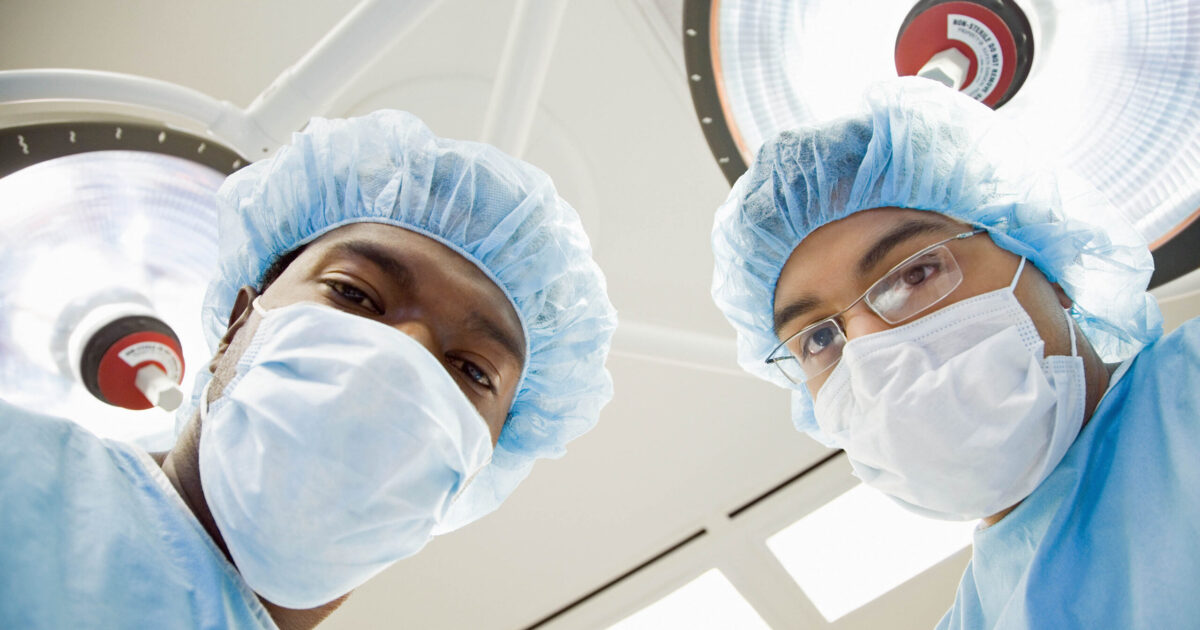Now that you’ve completed a surgical technologist program and entered one of the fastest-growing healthcare careers for 2024, you might wonder what’s next. The logical next move is to pursue the certified surgical technologist (CST) certification. Although some states and employers don’t require surgical techs to be certified, getting extra credentials and becoming a certified surgical technologist grants you the flexibility to work anywhere in the nation. Whether it’s your first attempt or you’re taking another shot at it, we hope this article helps you better prepare for your CST exam.
What Is the CST Exam?
The CST exam, offered by the National Board of Surgical Technology and Surgical Assisting (NBSTSA), is a comprehensive test that assesses a broad knowledge base to ensure the competency of entry-level surgical technologists. A personalized study plan tailored to your learning needs, time constraints and learning requirements is indispensable. The CST exam isn’t an exam suited for last-minute cramming. Thoughtful preparation is the key to successfully navigating the complexities of the CST exam.
Taking the exam to obtain your surgical technologist certification isn’t just a credential—it’s a commitment to excellence in your practice. Accreditation by a reputable organization holds you accountable and opens doors to numerous benefits. Certification is especially advantageous for those looking to level up their career and be the top pick for a staff CST job or travel CST role.
Who’s Eligible to Take the CST Certification Exam?

Graduates from a surgical technology program accredited by the Commission on Accreditation of Allied Health Education Programs (CAAHEP) or the Accrediting Bureau of Health Education Schools (ABHES) are eligible to sit for the CST exam. According to the NBSTSA website, you must provide one of the following documents to be eligible to register:
- A letter on institutional letterhead, notarized by the Program Director, indicating your name, graduation date and degree type
- A duplicate of your graduation certificate
- Transcript (unofficial transcripts are accepted, but NBSTSA may request an official transcript)
Understanding the CST Exam
The NBSTSA administers the CST exam and certification program. It complies with the National Commission for Certifying Agencies Standards for the Accreditation of Certification Programs. Some essential details about the exam include:
- Application Process: Create an account and log in to the practitioner page of the NBSTSA website to submit your application. While mail-in applications aren’t the preferred method and are susceptible to delays, they’re accepted if necessary.
- Application Processing Time to Exam: Expect a processing time of six weeks for your NBSTSA application and Authorization To Test (ATT) letter. Opt for rush processing at an additional $50 fee, guaranteeing a 3–5 business day turnaround before mailing your ATT letter.
- CST Exam Cost: For first-time certification, the CST Exam costs $190 for Association of Surgical Technologist (AST) Members or $290 for non-members. The total testing fees are payable to NBSTSA in advance, with testing ineligibility resulting in a refund minus processing and rush-processing fees.
- Exam Times: Exams are strictly by appointment. Apply, meet eligibility and schedule the exam at a nearby testing center. There are no fixed dates. Centers generally offer testing six days a week, twice daily.
CST Exam Outline
The NBSTSA provides a comprehensive exam content outline to aid your study. Be aware the most recent outline is dated 2023, and as of 2024, there have been modifications to the question layout. The CST study evaluation provides a more accurate but less detailed summary of questions in each category.
Let’s delve into the exam outline to assist you in your CST exam prep. Starting January 1, 2024, the CST Exam consists of 175 multiple-choice questions, with 150 scored and 25 for future exams (not impacting your score). You must answer 98 questions correctly within four hours to achieve a passing score.
There are 97 questions on perioperative care, further divided into the following subcategories:
- Perioperative Preparation: 29 exam questions based on 27 key knowledge areas. Some specifics include hand washing, reviewing the surgeon’s preference card, donning personal protective equipment (PPE), surgical scrub, draping patients and specialty equipment.
- Intraoperative Procedures: 66 exam questions derived from 29 points. These cover specific knowledge areas such as aseptic technique, performing counts, identifying instruments, monitoring medication, preparing dressings and wound sites.
- Postoperative Procedures: 10 exam questions related to 18 key areas. These questions include postoperative cleaning, patient transfers, case debriefing and inventory.
Ancillary duties make up 20 questions on the exam under the following subtopics:
- Administrative and Personnel: 10 questions including areas such as ethics, culture and knowledge of concepts.
- Equipment Sterilization and Maintenance: 10 questions, including questions on troubleshooting equipment and decontamination.
The remaining questions on the exam evaluate the candidate’s proficiency in science, including 50 questions in anatomy and physiology, along with 10 each in microbiology and surgical pharmacology.
Setting Up Effective Study Techniques

Successfully navigating the CST exam requires a well-organized study approach. Establish a structured study plan that aligns with your learning style and preferences. If motivation is challenging, engaging in group study can provide accountability to your study plan. However, self-study might be the optimal choice if you’re highly motivated. Striking a balance between both approaches also offers valuable benefits. Assessing your motivation levels helps you tailor your study strategy to maximize effectiveness and preparation for the CST exam.
Ensure you gather reputable study materials, including essential textbooks, review programs, online resources or mobile apps tailored to the CST exam content. A comprehensive study strategy and the right resources help increase your confidence and success on the CST exam.
Why are Practice Exam Questions Important?
Practice questions play a crucial role in CST exam prep by offering a simulated testing environment, allowing you to familiarize yourself with the format and content of the actual exam. They also help you develop time management skills, ensuring you finish your exam in the time allotted. Practice questions are practical tools for reinforcing learned material, identifying areas of weakness and building confidence.
Effectively incorporating practice questions into your study plan is crucial for success. We recommend the following tips:
- Incorporate consistent practice, where questions become a routine part of your study.
- Review answers to understand the reasoning behind correct and incorrect choices.
- Opt for timed sessions to enhance your ability to manage time effectively during the exam.
- Perform regular assessments to evaluate your knowledge and address weaker areas.
- Do a focused review of sections with consistently lower scores. If specific topics present challenges, consider exploring additional study materials or seeking clarification from a mentor or peer.
CST Practice Exam Questions
Consistently and strategically incorporating practice questions into your study routine boosts overall preparedness for success on the actual exam. Here are three practice questions to engage your surgical tech mind.
Question: In a sterile field, what is the primary purpose of maintaining an aseptic technique during a surgical procedure?
a) Aesthetic presentation
b) Reducing instrument cost
c) Preventing infection
d) Improving instrument lifespan
Answer: c) Preventing infection
Rationale: Aseptic techniques in a sterile field primarily aim to prevent infections by minimizing the introduction of pathogens.
Question: What is the primary responsibility of a surgical technologist in the counting process during surgery?
a) Ensuring patient comfort
b) Maintaining accurate records
c) Confirming proper room temperature
d) Monitoring anesthesia levels
Answer: b) Maintaining accurate records
Rationale: The primary responsibility of a surgical technologist in the counting process is to maintain accurate records to ensure no surgical instruments or materials are left inside the patient after the procedure.
Question: During a surgical procedure, what is the critical function of a surgical technologist when identifying instruments?
a) Enhancing the surgeon’s ego
b) Ensuring proper billing
c) Facilitating efficient teamwork
d) Avoiding unnecessary instrument use
Answer: c) Facilitating efficient teamwork
Rationale: Identifying instruments during a surgical procedure is crucial for facilitating efficient teamwork among the surgical staff, ensuring the surgeon receives the correct instruments in a timely manner.
Study Time Management Strategies

Effectively managing time during exam preparation involves balancing study, work and personal life. Setting realistic goals ensures a focused and achievable approach to your study plan. Recognizing the importance of breaks and downtime is equally vital, allowing for mental rejuvenation and preventing burnout. By implementing these time management strategies, you can optimize your study sessions, enhance productivity and maintain overall well-being throughout the preparation period.
Day-Of Test-Taking Strategies
On the crucial day of the CST exam, strategic preparation is vital to ensure a smooth experience. First and foremost, reduce any chance of self-induced error by knowing the test location, checking it out a day or two before, and understanding parking logistics, potential fees and traffic patterns around the exam time to avoid being late.
Visit the inside of the facility the day before to understand the surroundings and locate the exam room. While you won’t be able to enter, this familiarity minimizes surprises and contributes to a calm and confident mindset on exam day. Reducing uncertainties boosts nerve control, enhancing your overall readiness for success.
Another essential aspect is to ensure you have the required identification for admission to the test. Prepare your identification the night before the examination to avoid any last-minute surprises.
According to the NBSTSA website, exam candidates must present two forms of valid ID. One must be a photo ID. Accepted forms of ID include:
- Driver’s license with photograph
- State identification card with photograph
- Military Identification card with photograph
The following are acceptable as secondary identification:
- Social security card
- Employment ID card
- Student ID card
Managing your time during the exam is essential, allocating sufficient minutes to each question and avoiding spending excessive time on challenging ones. Overcoming test-related anxiety is crucial for optimal performance. Employ relaxation techniques, such as controlled breathing and maintain a positive mindset to boost confidence. Remember that a well-prepared and focused approach on the day of the CST exam significantly contributes to a successful outcome.
After the CST Exam
All candidates receive score reports. If you test 45 days post-graduation with transcripts submitted, you may get your report the same day. Unsuccessful candidates can reapply immediately without a wait period. Testing is limited to three times a year. NBSTSA keeps graduation details on file, but candidates must submit a new fee and application to retake the exam.
Additional Resources
Official NBSTSA CST Resources:
- 2023 CST Candidate Handbook
- CST Examination Study Evaluation
- CST Examination Content Outline
- NBSTSA Certified Surgical First Assistant Self-Assessment Examination
- CST Reference List
Helpful Online Resources:
Zander Perioperative Education: CST On Demand
- Self-paced, 120-day course
- Focus on knowledge base with assessments and practice quizzes to test retention
NBSTSA CST Practice Tests & Test Prep by Exam Edge
- Instant access to online practice exams
- Multiple test bundles to choose from 1-25 practice exams (each can be taken four times)
The Best Book Resources:
- Comprehensive prep book with the latest requirements
- 1000 practice questions
- 5 mock tests
LANGE Q&A Surgical Technology Examination, Eighth Edition
- Over 1700-exam style questions with rationale
- Organized into six sections to maximize study efficiency
- Includes 1-year subscription to Davis Edge online Q&A practice
- Format and essential content review for CST exam prep
- 1,600 practice questions with detailed rationales
Surgical Technologist Certifying Exam Study Guide
- The only AST-endorsed study guide makes this a popular study book
- Six practice exams
- 1,386 practice questions
Embarking on the CST exam journey is a thrilling challenge. Whether you’re diving in for the first time or giving it another shot, keep in mind the game-changing power of certification in sculpting your surgical technologist career.
Certification is a golden ticket to more job opportunities and a boost in earning potential. Explore the details of staff CST salaries and travel CST salaries on Vivian Health’s website for full salary transparency.
Find your first or next CST job on Vivian Health faster and easier than before.










Hello, do you offer refresher course & study groups? My daughter is getting ready to take the test but she’s very nervous.
Hello Renee and thanks for reaching out! Vivian doesn’t offer any CST refresher courses or study groups, but the organization that administers the exam offers several exam preparation tools here: https://www.nbstsa.org/cst-exam-prep. We’re an online jobs marketplace, so we’re not set up to provide study materials other than helpful blog posts like this one. We wish your daughter the best of luck on her exam and hope Vivian can help her with her future job search needs.